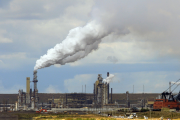It's a pity some journalists don't pay more attention to the world's leading scientists before pouring scorn on the notion that humans are causing climate change, otherwise known as global warming.
Dismissing the science may provide a comforting excuse for those of us who would prefer to carry on with business as usual, but it's irresponsible as well as just plain wrong.
The fact is that professional climate scientists are virtually unanimous that greenhouse gases from human activities, notably carbon dioxide (CO2), have become the dominant driver of climate change.
(I'm talking here about the scientists who publish research on the causes of climate change in scientific journals — not those who have more success in making a splash in the media than doing real science.)
Researchers recently analyzed 928 articles published in refereed scientific journals between 1993 and 2003 and catalogued with the keywords "climate change." They didn't find a single article that disputed the consensus that humans are affecting the climate.1
It's hardly a surprise that in May 2001 the national science academies of 17 countries, including Britain, Canada, China, France, Germany, India, Italy and Sweden, stated "it is now evident that human activities are already contributing adversely to global climate change." The academies urged governments to ratify the Kyoto Protocol, which mandates cuts in greenhouse gas emissions.
The U.S. National Acadamies of Science also backed this scientific consensus in June 2001. The American Meterological Society, the American Geophysical Union and the American Association for the Advancement of Science have all issued similar statements.
Measuring CO2 in the atmosphere is relatively straightforward. The level has leapt by one-third since the industrial revolution, mostly in the past fifty years. Human use of fossil energy (coal, oil and natural gas) and deforestation are clearly established as the causes.
CO2 traps heat because it absorbs infra-red radiation. You don't have to argue the details to see that a large increase in CO2 is going to cause global warming. When scientists do look at the details, they find that the projected warming is large enough to cause a wholesale transformation of the global environment in this century.
Sure, global warming is survivable, but there will be enormous costs and many casualties, especially in developing countries. And the natural environment will have been transformed out of recognition.
Yes, of course, the climate changes naturally too. But the key difference is timescale. In prehistory, the climate underwent upheavals over thousands of years. Now, humans are making this happen in decades.
I haven't even begun to address the other global impacts we're causing, such as the dramatic loss of species that is underway. The U.N.'s new Millenium Ecosystem Assessment helps acquaint us with the bigger picture.
The fact is that humans' technological advances (and our population growth) have accelerated to the point where we are using amounts of energy so large that the planet is suffering major impacts at the global level. We must act with the greatest urgency to limit those impacts.
1. Science vol. 306 (December 2004), p. 1686.






